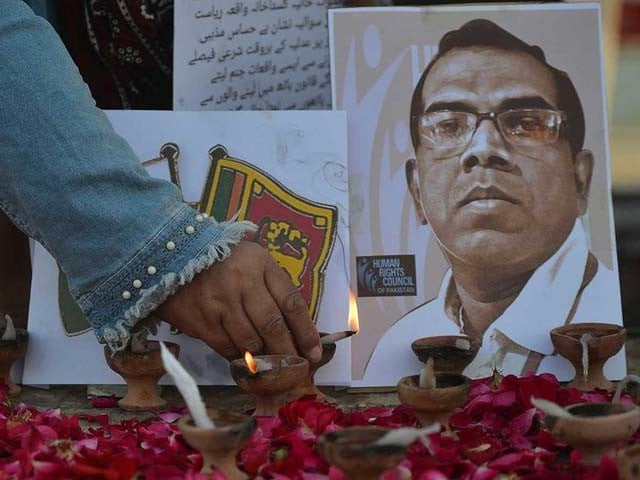Priyantha lynching convicts challenge verdict
Contend cardinal principle of criminal justice violated, miscarriage of justice

The convicts in the Sri Lankan national Priyantha Kumara’s lynching case have challenged the anti-terrorism court’s sentences awarded to them on different grounds, saying that the “cardinal principle of criminal justice was violated” and that it is a miscarriage of justice.
Appellants Taimoor Ahmed and Muhammad Ahmed filed an appeal though advocate Hafiz Israrul Haq, contending that they were neither nominated in the FIR nor in the supplementary statement and that no identification parade was held as per law and even the name of the alleged eye witness was not mentioned in the FIR but the trial court “illegally convicted them”.
Convict Taimoor had been awarded death sentence on two counts and 11 years rigorous imprisonment under different sections while convict Muhammad had been awarded eight years rigorous imprisonment under different sections.
The appellants in their appeal contended that “there are glaring contradictions between the complainant and other witnesses which casts doubt over the prosecution’s case. The prosecution witnesses who appeared in the witness box are interested, inimical to the accused as one of the prosecution witness Adnan Malik, whom the factory workers believe to be a hero, was the main accused and his evidence could not be believed to award punishment.
Read Nation outraged at Sri Lankan’s lynching by mob
The incident took place out of the reach of the CCTV footage but at the same time the inadmissible evidence of footage of mobile phones was admitted although their makers neither appeared before the court nor sent any original source of the video recording.
“There is an established principle of criminal law that if some plea is spelling out from the circumstances of the case benefit of that is to be given to the accused inspite of his denial of occurrence.
“It is a cardinal principle of justice that accused is entitled for very little doubt and in this case, so many infirmities were available which created doubts in the prosecution story, the judgment is harsh and against the settled principle of law.
“The trial court’s judgment is outcome of misreading and non-reading of the evidence available on record which has caused miscarriage of justice.”
They prayed the court that the impugned judgment be set aside.
On April 18, 2022, a total of 88 convicts had been sentenced while one was acquitted in Priyantha’s case who had been lynched by a charged mob over allegations of blasphemy at a factory in Sialkot.
Read More: High time to raise Kashmir issue at US Congress: Ilhan
The trial court had awarded death sentences on two counts to six convicts (Taimoor, Abdul Rehman, Muhammad Irshad, Ali Husnain, Abu Talha and Muhammad Humair) along with payment of Rs200,000 compensation to the legal heirs of the deceased namely under Section 302 PPC and Section 7 of the ATA, 1997. And nine convicted persons (Rohail Amjad, Muhammad Shoaib, Ihtesham Zaib, Imran Riaz, Sajid Ameen, Zaigham Mehdi, Ali Hamza, Luqman Haider and Abdul Saboor) had been awarded life imprisonment along with payment of Rs200,000 fine each and Rs200,000 as compensation to the legal heirs.
Seventy-two convicts were sentenced to two years (rigorous imprisonment) on three counts and one year on two counts. One accused namely Bilal had been acquitted of the charges.
Deceased Priyantha was working as a general manager at Rajco Factory in Silakot when on December 3, 2021 he had been murdered by a mob on the allegations of blasphemy. Later, the mob set his body ablaze. An FIR was registered at Ugoki police station.



















COMMENTS
Comments are moderated and generally will be posted if they are on-topic and not abusive.
For more information, please see our Comments FAQ